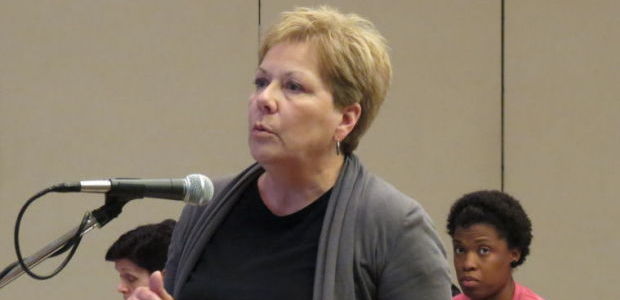
Hal Martin’s Weekly Racing Report
March 12, 2013
‘Field of Dreams’ taking shape
March 12, 2013Juvenile justice professionals in Terrebonne Parish say they are losing key battles in the war to keep children and teens safe, and to keep the community at large safe as well.
Promises of juvenile justice reform from Gov. Bobby Jindal and others with control over purse-strings for prevention programs and mental health care delivery sound good, local officials in the trenches say. But they aren’t holding their breath. And of late their concerns are increasingly vocalized.
“I am tired of losing children,” Brenda Johnson, deputy administrator at Terrebonne Parish Juvenile Court, said at a public health care forum at the Houma-Terrebonne Civic Center last week. “I have lost count of how many children have died.”
Interviews with Johnson, other court and probation administrators, medical professionals and other service providers, as well as families in need of help reveal evidence a local system in need of repair, where some services are available for children but can’t always be accessed because of technicalities in how laws are written or programs administered. Many of the problems encountered are the result of policies at the state level, or service providers whose budgets have gone through major cuts and may be experiencing more when legislators meet next month.
At a local hospital a teen bent on suicide was reportedly turned away last week because of a nurse’s belief that no beds were available there or anywhere else in the state.
Mental health services for children are available for children from low-income families who qualify for Medicaid but often with a long wait before they can be seen by a psychiatrist.
Programs that have psychiatrists readily available or have substance abuse programs for kids do not take private insurance, and so are available only to families that qualify for Medicaid.
The surest way for a child to get psychiatric care is confinement to a state-run juvenile jail.
NUMBERS SHOW NEED
Not all children with mental health problems get in trouble with the law, and not all children in trouble with the law have mental health problems. But state officials as well as local juvenile justice workers say that relating the two is inescapable. There is a clear link, they say, between youngsters who need juvenile justice processing and the need for mental health care or substance abuse programs. Leaving children untreated can result in suicide, crimes against other children or adults, a steady progression of incarceration and, sometimes, death or injury on the streets because of adherence to a lifestyle linked to illicit drugs and the violence related to it.
Last year, 561 children ages 10 through 16 were the subjects of 1,719 juvenile cases filed in Houma City Court, according to court statistics. Their offenses ranged from truancy or curfew violations to drug offenses and violent crimes.
Terrebonne’s population of children – those under 18 – was just over 29,000 in 2010. That means one juvenile court case was filed for every 17 children in the parish. In Louisiana as a whole, which has an estimated 1.8 million children, there was approximately one juvenile court filing for every 100 children in the state.
Tremendous variables exist within such statistical analyses, administrators warn, and for various reasons don’t give a true picture of what problems truly exist. But they acknowledge that such a comparison, given the data available is fair.
But statistics, they also maintain, don’t come near telling the story. Half of the children in Houma’s juvenile court – which serves the entire parish of Terrebonne – are in need of some form of mental health treatment.
Jindal’s support of reform in the juvenile justice system is rooted in the same sort of understanding.
“The bottom line is many of the youth referred … are from broken and abusive homes, have not committed a crime, and need help, not jail time. This needs to change. We need to work with these youth on the front-end to get them the treatment they need to grow up and lead productive, healthy lives. These reforms would prohibit children with non-criminal or non-delinquent offenses from being referred to formal (proceedings) and potentially locked up in detention or a residential facility.”
SAME PAGE
The reasons for juvenile justice reform are clear, Jindal has said, from a variety of perspectives.
“Juvenile incarceration is a direct indication of the likelihood of adult incarceration,” Jindal said. “For example, research has shown that juveniles who are incarcerated are three times more likely to enter adult prison later in life compared to those who are were not committed to a facility earlier in life. Involvement in the juvenile justice system reduces a youth’s likelihood of completing high school, which in turn is associated with obtaining a lower paying job and an increased likelihood of participating in criminal activity.”
That’s old news to Johnson and others who work closely with youngsters, who appreciate Jindal’s intent but question how proposed legislation – whose sponsors are still working on the fine print – will help make things better.
“We are with these kids every day on the ground, holding them, turning them away and telling them, ‘I am so sorry we can’t give you that service.’ We are their voice and I am having to scream of late because people are not hearing our voice for these children and I am fed up with it,” Johnson said. “I have thought of getting some kids and bringing them to the Governor’s Mansion and saying, ‘Here, they need services.’”
What is maddening for her and other professionals is that psychiatrists, addiction programs with proven track records, and other services do exist in Terrebonne Parish and other local communities.
Obtaining admission for some children to those programs, professionals say, is a daunting task. Complex Medicaid rules and private insurance company mandates, the child advocates stay, often stand in the way of youngsters receiving help. State budget cuts that fall heavily on the backs of public health programs are not projected to make things better.
“The discussion needs to be about more layers in place before kids get to our front door,” said Jason Hutchinson, director of the Terrebonne Parish Juvenile Detention Center, which held about 600 youngsters last year for stays ranging from a day or two to several weeks, in some cases as long as a month. “There must be more options for the courts before detention. We know that the moment they hit the front door for the first time, chances of re-offending go through the roof. We need to try to do any type of preventive thing, and keep our spaces more for those who are here for aggravated circumstances, violent offenders, sex crimes. Does a kid who takes a pack of bubble gum need to be housed in here?”
PARENTS MUST HELP
The detention center is one step up the penalty ladder for youngsters. Those who have had frequent clashes with the law end up in state custody and at that point, Hutchinson and other professionals say, salvaging is difficult if not impossible.
Like Johnson, Hutchinson is aware that mental health services are key not only to keeping kids from ending up in his facility, but keeping them from coming back once they spend time there.
He now has tools for assessing those in his care, the most important of which is a licensed professional counselor. The South Central Louisiana Human Services Authority, under the direction of Lisa Schilling, now manages mental health services for children and adults in Terrebonne. Schilling and Hutchinson have worked closely together so that children from the juvenile detention center can receive treatment after screening by the LPC or if can continue to receive services if they were already on the list.
“If the child has private care we can make sure that care stays seamless, we have gotten on the phone and used cooperation with other agencies that have a child in their system,” Hutchinson said. “The discussion we need to have is if we get the kid in here and our LPC is picking up on him, that he needs services, and he goes home in two weeks, there is an obligation on the parents’ part.”
But parents often don’t pick up on that obligation, Hutchinson said, and when that happens the same youngster will likely end up at the detention center’s gates once again.
The system is not fool-proof.
THREE-MONTH WAIT
An important reason for parental involvement is that youngsters who need a psychiatrist through South Central Louisiana Human Services often cannot see one right away. The waiting list, according to court personnel, can be months long. And without the psychiatrist proper medicinal decisions cannot always be made.
Schilling said she is doing everything she can to see that all youngsters who need that type of help get it but acknowledged that there are staff and budgeting issues that constrain what the agency can do.
Currently, most youngsters treated through Schilling’s agency get their first assessment from an actual psychiatrist through a tele-link between Houma and New Orleans.
But a recent request from juvenile court for a psychiatric evaluation resulted in a reply that such a tele-visit could not take until May – three months down the road.
Nonetheless, court administrators, Hutchinson and others working in the Terrebonne juvenile justice system say things are better than they were a decade ago, when grandmothers were driving children 125 miles to see a doctor. Schilling and Hutchinson agree that whenever possible, especially in emergencies, the agency tries to accommodate.
More immediate help is possible through other agencies, such as Magnolia Health Services in Thibodaux. But there is a catch. According to Magnolia’s director, Jamilah Olivier, Medicaid will not reimburse the agency for children who are in detention, due to state-created rules.
“It is a huge problem,” Olivier said. “Once these kids are in the state’s custody or a facility such as the detention center, according to the state it is that facility’s responsibility to provide mental health services. The state will not reimburse me for that.”
For children not in detention but in need of services, according to Brenda Johnson, there is another hurdle to overcome, if parents have private insurance.
Magnolia only provides service to children eligible for Medicaid, or the expanded LaCHIP program, which allows those with higher incomes to access doctors and counselors.
MEDICAID LOOPHOLES
Louisiana Medicaid actually has an income ceiling consistent with about half of the nation’s 50 states.
To qualify under Louisiana’s CHIP program, a family must have a combined income that is at 250 percent of the federal poverty level or lower.
For a family of two – say one mother and her daughter – the federal poverty level is $15,510 annually. At the 250 percent threshold, which means the family of two is eligible for CHIP so long as annual income is $38,775 or less. A family of four would be eligible so long as the combined income is $58,875.
With income numbers, the devil resides comfortably within the details. For families whose children need mental health services, LaCHIP is not available if other insurance exists. Services through Magnolia would not be available to them.
“We are not set up directly with Blue Cross or other private providers,” Olivier said. “They do not reimburse for those types of services.”
Other services, like a drug treatment program juvenile court officials say is highly successful, are also not reimbursed by private insurers, although Medicaid will pay for them.
“So if I have a child who has private insurance I cannot refer him to those programs,” said Johnson. Since most people with private insurance are working, that means working families in Terrebonne are shut out of services that could help keep their kids out of juvenile detention or out of the state system if they get in trouble. Court administrators are quick to point out that mental health issues as well as substance abuse in children is not restricted to families with low incomes, or who are not working.
TRAGIC CAROUSEL
In emergency situations juvenile justice officials and families have had varied success getting psychiatric help.
Two weeks ago a 16-year-old who had lived on the street for weeks with a serious drug addiction problem, according to authorities, was picked up by police and brought to the juvenile detention center. After arrival he made clear to workers he was bent on killing himself, and was unable to be contained for his own safety.
Hutchinson said the center is allowed to restrain, but that those efforts can only go so far. So the boy was brought to Leonard J. Chabert Medical Center.
The stories diverge from that point. According to Johnson, Hutchinson and other officials, a charge nurse refused to admit the child, stating there were no facilities for him.
He was brought back to the center, and the next day Hutchinson went to Chabert with the boy and his workers. Administrators agreed to accept him, and he was sent to a mental hospital in Monroe, the closest place where a bed was available.
Officials at Chabert said they can hold psychiatric patients in an emergency until a bed can be found somewhere, but available places within the state for children and teens are hard to find.
“The proper procedures were followed and the patient was dealt with appropriately,” said Chabert nursing supervisor Pam Wright. It is the practice at Chabert, she said, to take children on an emergency basis and keep them if necessary under observation in the emergency room, under secure conditions.
Juvenile justice workers maintain that if they had problems getting a teen in need seen by a doctor, then parents who try to get help for their children on their own might face greater obstacles.
Hutchinson said that despite the best efforts put forth by Schilling and others who handle the bulk of Terrebonne’s mental health needs, the time-table for treatment of a child by a psychiatrist is way off.
“They will not see the psychiatrist until they are out of detention,” Hutchinson said. “It is their policy.”
In one case, Hutchinson said, a girl with psychiatric needs was taken to the mental health center and registered. She was released from detention but her grandmother followed up and got her to be seen by a doctor.
“The girl was re-arrested and on a probation violation, we needed to bring her there and we brought her and they turned us away,” Hutchinson said. “That’s why here I am not going to start that process unless the child needs medication or is in real depression with behavioral issues, really miserable in their own skin. If these children were on their meds in the first place maybe they would not get in trouble.”
Ironically, adults jailed at the adult criminal justice complex next door to the detention center are able to get treatment far more easily than children in detention. Terrebonne Parish Consolidated Government runs the adult jail’s medical portion, and a psychiatrist is part of the package.
Parish officials say there is no money in their budgets for a psychiatrist at the Juvenile Detention Center. But Hutchinson maintains that doesn’t change the need, maintaining “I need a psychiatrist here.”
Terrebonne Parish Juvenile Court coordinator Brenda Johnson addresses officials at a forum on behavioral health in Louisiana held at the Houma-Terrebonne Civic Center.

















